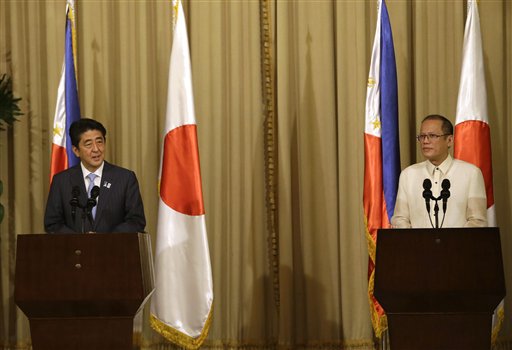
Philippine President Benigno Aquino III (right) and Japanese Prime Minister Shinzo Abe appear before media in this June 24, 2014 file photo. The Philippine foreign affairs department said Japan has pledged $2 billion for the North-South Commuter Rail project. AP
The Japanese government has pledged $2 billion in loans to the Philippines to fund the first phase of the North-South Commuter Railway project, the 36.7-kilometer railway from Tutuban to Malolos in Bulacan province.
The official development assistance (ODA) package from Japan represents the largest ever for a single project in the country, the Department of Foreign Affairs (DFA) announced on Wednesday midnight.
Foreign Affairs Secretary Albert del Rosario met with Japanese Foreign Minister Minoru Kiuchi on Wednesday on the sidelines of the Association of Southeast Asian Nations (Asean) Ministerial and Related Meetings in Kuala Lumpur, Malaysia, where he received the ODA pledge.
The pledge came following Japan’s announcement of its commitment in firming up the cooperation with the Philippines for projects in the transportation sector.
The Philippines and Japan have created the “Cooperation Roadmap for Quality Infrastructure Development in the Transport Sector in Metropolitan Manila Area,” which was agreed upon during President Aquino’s state visit to Japan in June.
Single-biggest package
“The North-South Commuter Railway (NSCR) project, phase 1 is poised to be the single-biggest ODA yen loan package to date that Japan has given any development partner,” the DFA said in its statement.
The NSCR, which the Department of Transportation and Communications will implement, involves the construction of a 36.7-km narrow-gauge elevated commuter railway from Malolos to Tutuban, it said.
During the meeting, Del Rosario and his Japanese counterpart discussed planned initiatives for closer security cooperation, including the acceleration of the discussion for an agreement on the transfer of defense equipment and technology.
Del Rosario then expressed appreciation for Japan’s continuing support for Mindanao peace process, including the Japan-Bangsamoro Initiative for Reconstruction and Development (J-BIRD) II project.
The J-BIRD project was launched in 2006 to pursue Japan’s commitment to the peace process between the Government of the Republic of the Philippines and the Moro Islamic Liberation Front.
Dev’t projects
Under this program are dozens of grassroots and development projects in Mindanao.
The South China Sea issues were not left out in the Philippines-Japanese meet as the two ministers exchanged views on the regional and international situation, including maritime security, and reiterated the need for the rule of law and the peaceful settlement of disputes.
Japan is one of the Philippines’ two strategic partners, the other being the United States.
During Aquino’s state visit to Japan, he signed a joint declaration for an enhanced strategic partnership with Japan Prime Minister Shinzo Abe, bolstering Philippine-Japan ties particularly in the areas of security and economic growth amid China’s aggressive activities including reclamation and dredging in the disputed waters in the South China Sea.
Originally posted as of 10:16 AM | Thursday, August 6, 2015

